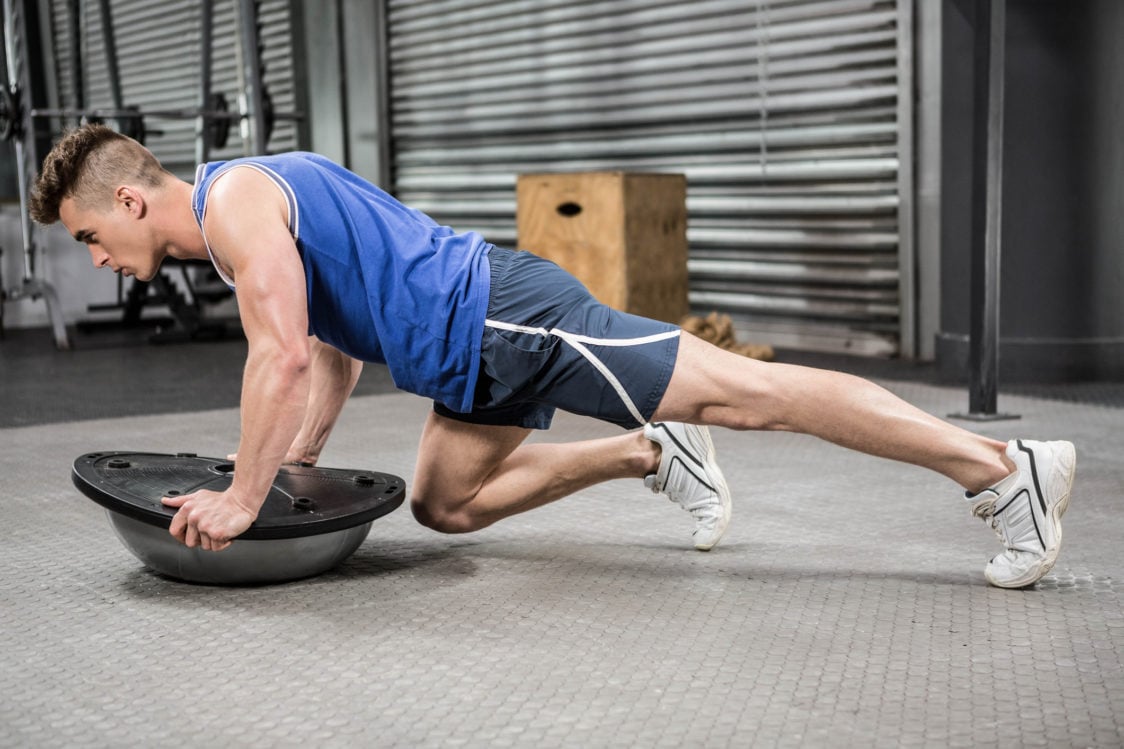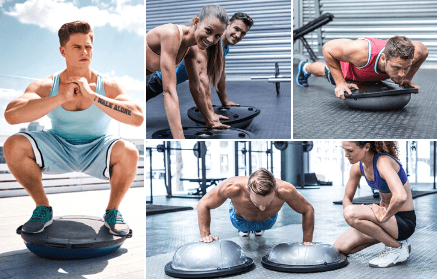Table of Contents
When it comes to quality training, most people imagine hours spent doing strength exercises at the gym or any form of cardio. But when was the last time you said, or have you ever said, “It’s time for balance training!”? It is certainly nothing new to you that exercise requires a complex approach, and its intensity and muscle load should change regularly.
Balance exercises are essential for the overall physical condition because people need balance and stability in almost all common activities, for example when walking up the stairs with shopping bags or going to work on icy or uneven ground surfaces. After all, all of us unknowingly trained balance in early childhood when our parents taught us to walk or to ride a bicycle.

As we grow older, our balance gradually gets worse, but don’t despair. Once you know the basic exercises to improve it and do them regularly, you can significantly improve stability. What’s more, getting rid of back pain or cervical spine pain can be a sweet reward for doing balance training regularly. A balance trainer is a versatile fitness tool that will help engage muscles during an exercise thanks to which you can easily and effectively train more muscle groups.
In this article, you will find out why it is worth including exercises with a balance trainer in your workout routine, and learn the best balance exercises tips to strengthen your back muscles and entire body.
Benefits of balance training
Balance training is often neglected and underestimated, although it has several undeniable benefits. Above all, it has been discovered that it helps improve posture and strengthen core muscles. Along with strength, endurance, and flexibility, it is one of the four basic types of exercise. This type of training contributes to the better overall stability and helps to prevent falls, which is a common problem, especially in the elderly and stroke patients. Balance exercises can also be very beneficial for obese people because their weight is not always carried or distributed evenly throughout the body. [1-2]
Balance can be divided into two types, static and dynamic. Static balance is the ability to keep the balance at rest when you are not moving, and the dynamic balance is the ability to keep the balance while moving. This type of balance is especially important for athletes during intense encounters with the opponent. It is interesting that even in a state of static balance, our body must activate about 300 muscles. Both static and dynamic balance, are vital and can be improved by specific exercises to target muscles, which we will discuss in a moment. [3]
By the way, let’s go back to sports for a while. Here, top athletes can tell us a lot about balance training. In some well-known sports, such as gymnastics, skiing, or skating, balance can even decide on whether the participant will win or lose. Balance training helps athletes reduce the risk of ligament problems and prevent ankle injuries. [4-5]

Balance trainer and its benefits
As we outlined in the introduction, if you are considering including balance training in your fitness plan, you should definitely consider purchasing a balance trainer. It is basically a half ball with a flat platform and its benefit lies in the versatility of its use. And, it is up to you which half you will use during exercise.
The high-quality balance trainers also include 2 removable expanders with comfortable foam handles, which allow you to try different types of exercises. When exercising with it, the so-called deep stabilization system is activated, which is involved in stabilizing the body. These include the pelvic floor muscles, back muscles, but also the muscles of the spine and back of the neck.
Exercising with a balance trainer has several essential benefits:
- helps prevent injuries
- helps during rehabilitation
- improves posture
- relieves back pain
- diversifies training routine [7]
10 exercises with a balance trainer
Keep in mind that balance exercises are not sprints, so you need to pay attention to accurate movements, and the technique of the exercise itself, rather than its intensity. Most importantly, you should relax and focus on slow controlled movements.
You may feel a little frustrated at the beginning because the exercises will seem challenging or even unmanageable, but over time you will feel more confident on the balance trainer. For all the exercises we will discuss, alternate legs and try to do at least three sets. The number of individual repetitions depends, of course, on your physical condition.

1. Single Leg Balance
One of the basic exercises, which is the “first check-up” and a good test to determine the level of your balance. Stand on the balance trainer with your feet wide apart and weight evenly distributed between the two feet. Raise your arms to the side and slowly bend your knee and lift the leg into the air until the balance is transferred only to the straightened leg. Try to raise your knee at least to hip level (the higher, the better). If you dare, and you want to make this exercise a little harder, put your hands on hips.
2. Lunges
This exercise requires much more stability and balance. Stand behind the balance trainer and slowly step on it with one foot. Your right leg should be extended behind you. Keep your back straight so that your body weight is evenly distributed between the two feet. Look forward, keep your chest up and your shoulders back. Do a half squat so that your front leg is at a 90-degree angle. Engage your butt, abs and the leg placed on the balance pad. You will feel how your anterior (quadriceps) and posterior thigh muscles (hamstrings) and glutes (sciatic muscles) work. Your right leg should only use the front of your tiptoes. The farther the rear leg is, the more you engage your butt and hamstrings. Again, you can try a more challenging variation of this exercise – reverse lunges with the starting position on the balance trainer.
3. Squats
Do you dare to do one of the most complex exercises? When squatting, start again in an upright position on a balance trainer with your feet shoulder-width apart. Raise your arms in front of you, bend your knees, and slowly squat down. Depending on your level of physical condition, you can go down as low as possible, but try to reach at least a 90-degree angle in your knees again, while keeping your back constantly straight. When returning to the starting position, focus on your thighs and butt. You can make this exercise more difficult by stepping on and going from side to side, with one foot on the balance trainer. Is it easy for you? Then try the popular, but a little more challenging squats on a balance pad ball with resistance bands.
4. Push-ups
The Guinness world record for push-ups will probably remain set for a long time, but if you place the balance trainer with the ball side on the floor, you can practice your balance perfectly. Your hands should be shoulder-width apart. Keep your arms straight and hover your shoulders directly over your hands. Go up until you get to the starting plank position for a moment with your body stretched out and do not let your butt dip or stick out. Stay in this position for at least two seconds and then slowly lower your body so that the chest will slightly touch the balance trainer. In order to master this exercise, it is important to first master the push-up itself. [8]
5. Plank
This variation of plank is becoming more and more popular. It is performed with elbows placed on the balance trainer, and it will thoroughly check your physical condition. It is very important to keep your body in a straight line during a plank. If you have ever tried this exercise, you can imagine that it is a bit more difficult to perform on a balance trainer than on a flat floor. Make sure you hold a plank correctly, do not lower your hips or arch your back. Follow the common saying that less is more and do not forget to breathe regularly. It can make your workout easier.
You might be interested in these products:
6. Mountain Climbers
You should not forget the plank crunches if you want to strengthen your core, arms, and lower body parts. To start with, it is necessary to stay in a position similar to a push-up with the difference that you should allow your butt to rise up a bit. Put your hands on the soft part of the balance trainer and pull your knees alternately towards your chest. Keep your back straight and try to move your feet as quickly as possible but be careful not to bend your hips down or up, keep them in a straight line. You should master this exercise in terms of balance quite easily, however in terms of intensity it is rather challenging.
7. Bird Dog
To strengthen the core and gluteal muscles, we recommend doing an exercise with the distinctive name Bird Dog. It focuses not only on the abdominal muscles and back but also on the erector spinae muscles. The name quite clearly describes its technique because you need to begin on all fours in the tabletop position on the balance trainer. Keep your knees under your hips and your hands under your shoulders. When you feel steady try to lift your right hand and your left foot at the same time. Do not lean to the side, keep your spine in a neutral position, and remember that it is essential to maintain stability, so you should move slowly. When moving back to the starting position, take a deep breath, and alternate leg and arm. At a more advanced stage, you can try to stay in the “flying” position for a few seconds.
8. Superman
At first glance, this exercise looks easy, but it will surely surprise you. One of the most important things in doing Superman is the position of your waist and hips. If you lie too far forward or backward, doing this exercise can be quite challenging. Lie facedown on the balance trainer, raise your arms and legs, and hold as long as possible. If it is hard for you to keep your legs together, and you cannot maintain balance in this position, you can keep them about hip width apart. You can also make this exercise more challenging by lifting your arms and legs and forming a straight line. If you have more experience, ask someone to helps you make your exercise harder by gently pressing your shoulders or hips during the exercise. This will engage your body core more. Do you dare to try?
9. Hyperextension
In the gym, you can see fitness enthusiasts doing this exercise on a workout bench, but with a balance trainer, you will easily target not only your erector spinae, lumbar and gluteal muscles but also your stability. Lie facedown on the balance trainer and try to tilt so that you can maintain the balance. Place both knees on the floor, place your hands behind your head or forearm, and in this position engage the core of your body, lift your chest off the ball to hyperextend the lower back. When moving up, exhale and come up enough to get a squeeze in glutes and the lower back. Inhale slowly, go back to starting position and repeat as many times as possible. Again, if you want to make this exercise more difficult, lift not only your chest but also your legs.
10. Rear Delt Raise
Rear delts exercise is one of the easiest exercises that we will present to you as an inspiration for balance training. Start from a similar starting position as for hyperextension lying facedown on the balance trainer, and keep your legs outstretched with your toes placed on the floor. If you have trouble maintaining stability in this position, place your feet wider. Keep your whole body in a straight line, keep your hands in the air, while your elbows should be at a 90-degree angle. Stretch both hands so that they reach approximately the level of your head in the upper position. The back of the shoulders, the middle and back head of the deltoid muscles, but also the core will be engaged. If you are more advanced and have no problems with balance, you can also take some weights.
What is the conclusion?
Balance facilitates almost all our everyday activities during which we are moving or standing. Thanks to a better balance, you can move with greater confidence, and make more coordinated movements. Improving your balance through balance training also helps improve overall health and physical condition. That is why it is a regular part of the training routine of top athletes.
The balance trainer is a great and versatile accessory to improve balance. It will help you engage more muscles in exercise, and you can easily and effectively train almost all muscle groups.
You can do the balance exercises we have mentioned every day. They will contribute to the better overall stability, and although it may hard in the beginning, if you don’t give up and persevere, the result will definitely be worth it!
Have you ever tried exercising with a balance trainer? If so, which exercise do you like most? If the article inspired you and the balance trainer will become an essential part of your balance training, share it with your friends. Maybe you will do these balance exercises together!
[1] American Hearth Association – https://www.heart.org/en/healthy-living/fitness/fitness-basics/balance-exercise
[3] Dunsky A., and col. – https://www.hindawi.com/journals/bmri/2017/6987017/
[4] Han J., and col. – https://www.hindawi.com/journals/bmri/2015/842804/
[5] Brachman A., and col. – https://www.ncbi.nlm.nih.gov/pmc/articles/PMC5548154/
[6] Sorgen C. – https://www.webmd.com/fitness-exercise/features/balance-your-way-to-stronger-body#1
[7] LifeSpan – https://www.lifespanfitness.com/workplace/resources/articles/balance-board-benefits
[8] Guinness World Records – https://www.guinnessworldrecords.com/news/2020/6/meet-the-man-whos-broken-12-phenomenal-push-up-records-621850


Add a comment
You must be logged in to post a comment.